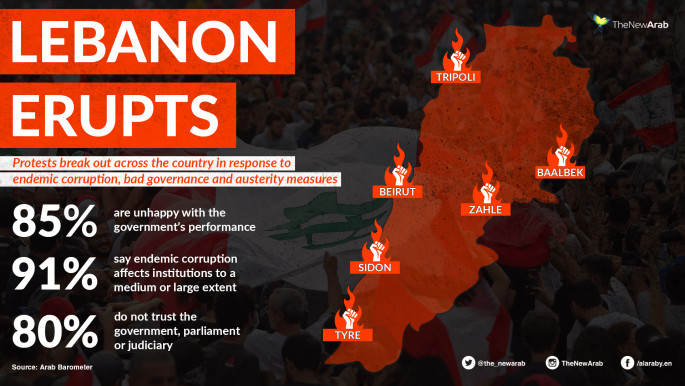Lebanese protesters claim victory after forcing parliament to scrap bid to 'pardon corruption'
Lebanese protesters successfully prevented parliamentarians from entering Beirut's Parliament Square and attending the legislative session they vowed to disrupt.
The session, which had initially been scheduled for last week but was postponed to Tuesday amid security concerns, would have been lawmakers first meeting since protests erupted on 17 October.
Lebanese MP's were set to discuss a controversial general amnesty law which protesters have strongly criticised as potentially enabling politicians and political figures to escape prosecution.
An unprecedented protest movement against the ruling elite in Lebanon entered its second month Monday with the country in the grip of political and economic turmoil.
The leaderless pan-sectarian movement has swept the Mediterranean country since October and prompted the resignation of Prime Minister Saad Hariri's government.
Parliament Square appeared to have been cordoned off with fences and barbed wire on Tuesday and protesters were met by a heavy deployment of security forces in central Beirut, Reuters reported.
Videos on social media show rows of security blocking the main streets entering Parliament Square, with scuffles breaking out as protestors attempted to take down the fences and barbed wire.
There are also reports of security forces firing live fire in the air to push back protesters.
|
Politicians hoped to reach Beirut's parliament by entering through the road blocks in vehicle convoys. But a Beirut journalist who entered Parliament Square Tuesday shared videos of empty streets and confirmed the Parliament Chamber was empty.
|
Only one or two members of parliament managed to make it to the parliamentary session, according to Timour Azhari.
"In any case the roadblocks by protesters have proven to be very effective," he tweeted.
|
"How are they holding a session and not responding to the people? Those (MPs) that are in the session have nothing to do with us, and it's not what we asked for," one protestor told a Reuters reporter.
Demonstrators are demanding a complete overhaul of the political class and for a new government of technocrats not affiliated with traditional parties.
Protesters have decried everything from unemployment to chronic power cuts and say they are fed up with the same families dominating government institutions since the end of the 1975-1990 civil war.
Tuesday's parliamentary session, which was initially scheduled for last week, had planned to discuss included draft laws related to corruption, old age pensions and the controversial general amnesty law.
Parliament Speaker Nabih Berri is expected to formally announce the postponement later on Tuesday, Reuters reported.
Read more: Nobody knows Lebanon's problems better than its women. It's time you started listening
Several lawmakers said they would not attend the legislative session on Monday, Daily Star reported.
"Does our country need any more laws?" Lebanese Forces leader Samir Geagea said in a televised news conference Monday.
"Our problem is that laws aren't applied, not that there aren't enough new ones."
On Sunday, thousands of Lebanese flooded main squares in Beirut, second city Tripoli in the north and the southern port city of Sidon as well as other parts of the country.
They dedicated their rallies to the "martyrs" of the "revolution" - two men who lost their lives in the protests.
Independent figures needed
Hours earlier, independent candidate Melhem Khalaf was elected head of the Bar Association, beating a rival backed by political parties, in what some Lebanese hailed as a victory for the protest movement.
"A thousand congratulations to the revolutionaries," filmmaker Lucien Bourjeily said in a tweet.
Lawyers who helped elect Khalaf erupted into cheers, chanting "Revolution! Revolution!"
Read more: Why Gebran Bassil is the most reviled politician in Lebanon today
Khalaf said he hoped his election would pave the way for independents to be selected for government jobs.
"The Bar Association will be a bulwark of public freedoms and human rights and a guarantor of the edification of a just state," he said.
The protests have been largely peaceful, but two people have been killed since they started.
Alaa Abu Fakhr, a 38-year-old father of three, died on Tuesday when an off-duty army officer opened fire as demonstrators blocked roads in the coastal town of Khalde, south of Beirut.
The other fatality, Hussein al-Attar, was killed early on in the movement as demonstrators blocked the airport road.
Economic challenges
On Sunday, army chief General Joseph Aoun, in his first remarks since the protests began, condemned the "unauthorised" blocking of roads.
The demonstrations erupted spontaneously on 17 October after the government announced a plan to tax calls made via free mobile phone apps such as WhatsApp.
They were fuelled in part by fears of a currency devaluation and a dollar shortage after banks restricted access to the greenback, causing unofficial exchange rates to spike.
 |
On Friday, S&P Global Ratings downgraded Lebanon's sovereign debt, saying a twin political and economic crisis had hit investor confidence and constrained the government's funding model, which relies on deposit inflows.
Moody's rating agency downgraded Lebanon's sovereign debt earlier this month.
Even before the protests began, economic growth in Lebanon had plummeted in the wake of repeated political deadlocks in recent years, compounded by the war in neighbouring Syria.
Public debt stood at more than $86 billion, or higher than 150 percent of GDP, according to the finance ministry.
The World Bank says around a third of Lebanese live in poverty and has warned the struggling economy could further deteriorate if a new cabinet is not formed quickly - a tough challenge, in a country where administrations must maintain a delicate confessional balance.
Follow us on Twitter and Instagram to stay connected





 Follow the Middle East's top stories in English at The New Arab on Google News
Follow the Middle East's top stories in English at The New Arab on Google News


![22 Arab countries at COP29 have rejected the targeting of fossil fuels [Getty]](/sites/default/files/styles/image_330x185/public/2024-11/GettyImages-2184289638.jpg?h=199d8c1f&itok=ptHl5bec)